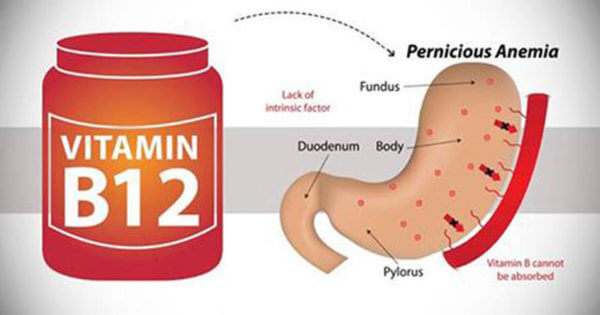Despite consuming a food rich in meat and dairy, specialists says that one in every four adults in America suffers from a vitamin B12 deficiency. This vitamin is the only water-soluble vitamin that can be placed in the liver for long time. So, this is why it’s very important nutrient that the body always makes sure to have some in stock.
Benefits Of Vitamin B12
B12 is important for the functioning of the nervous, digestive, vascular and reproductive systems. It regulates hormone production, supports a healthy immune system and builds red blood cells and DNA. It’s also important for protein metabolism and the conversion of carbohydrates into glucose.
Cause Of Vitamin B12 Deficiency

Vitamin B12 cannot be produced by the body, it has to be ingested. Most people suffering from B12 deficiency simply aren’t getting enough of the nutrient in their diet.
Natural sources of the vitamin include organ meats, shellfish, meat, poultry, eggs and dairy (3).
Vegetarians and vegans can consume this vitamin by eating algae, nutritional yeast and seaweed, but these sources often aren’t enough. If you’re vegetarian you might also need to rely on B12 fortified foods or taking supplements.
B12 deficiency is also common in people over the age of 50 (3). As your age, it becomes increasingly difficult for your body to absorb vitamin B12 from foods because you produces less stomach acid, which is vital for nutrient absorption.
Also, you may not be able to process vitamins properly if you suffer from digestive problems, such as Crohn’s disease or Celiac’s disease.
Prescription medication can also interfere with the body’s ability to absorb this vitamin.
Symptoms of Vitamin B12 Deficiency
Vitamin B12 is essential for brain health. A study from the Rush University Medical Center found that:
“poor vitamin B12 status is a potential risk factor for brain atrophy and may contribute to cognitive impairment,”(4).
That’s not all, because the vitamin plays such a big role in essential bodily functions, vitamin B12 deficiency can manifest itself in the following ways (5,6,7,8):
- Anemia, megaloblastic anemia and pernicious anemia
- Loss of balance and confusion
- Numbness or tingling in the arms and legs
- Weakness
- Constipation, diarrhea, a loss of appetite, or gas
- Nerve problems like numbness or tingling, muscle weakness, and problems walking
- Vision loss
- Mental health problems (including psychosis and depression)
- Dementia
- Alzheimer’s
- Heart disease
Luckily, most of these symptoms can be reversed if promptly treated with proper B12 intake. Talk to your nutritionist to find out how to safely incorporate more of this essential vitamin into your diet.
 Freshsein
Freshsein